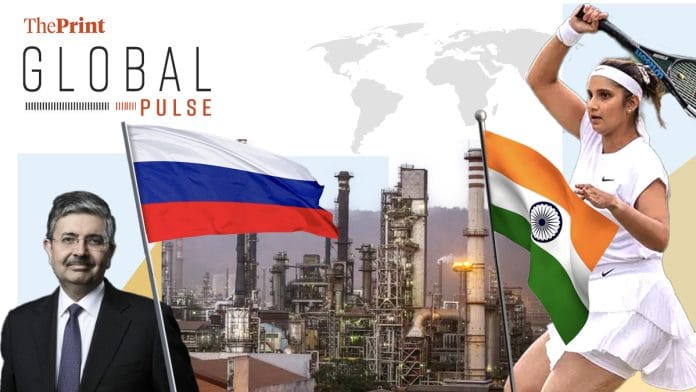New Delhi: In a report in Financial Times titled ‘Why Trump is really targeting India’, former policy adviser in the Ministry of External Affairs Ashok Malik appears to give a rejoinder to White House counsellor Peter Navarro’s article spotlighting “India-Russia oil mathematics”.
‘India’s oil lobby is funding Putin’s war machine—that has to stop’, says Navarro, referring to the argument that Americans buy Indian goods, and India uses those dollars to fund the “Russian war machine”.
Malik writes that India “had little choice” but to buy discounted Russian crude as the Ukraine war “upended energy markets” and it was outpriced by European economies.
“India was even encouraged in this endeavour by the previous US administration, whose officials publicly stated that this step contributed to global energy market stability and kept prices manageable. The Trump administration seemed to be going along with this approach, until one day, without warning, it changed its mind. Interestingly, (Russian) President (Vladimir) Putin, in his remarks in Alaska, said US-Russia trade increased by 20 per cent after President (Donald) Trump came to office,” he says.
Also in Financial Times, “bank billionaire” Uday Kotak urges the Modi government to encourage small and medium industries to withstand the impact of Trump’s tariffs.
“We must think about this as an opportunity for us to get out of our cruise mindset and from a comfort mindset to ‘we are at risk’,” he is quoted as saying in the report.
“Kotak said the tariffs were a ‘major shock’ that had ‘woken Indians up’ to the risks to the Indian economy of Trump’s trade war,” it says. “He called for ‘direct fiscal support’ from the government to ‘turbocharge’ small businesses in manufacturing, research and technology.”
“Once you give that capital support, private equity, entrepreneurs’ equity (and) risk capital will come additionally,” he is quoted as saying.
In The Washington Post, Rick Noack reports that it’s a known fact now: Prime Minister Narendra Modi and Trump are on the outs and a critical strategic relationship, honed over decades, is in jeopardy. However, it is India’s neighbour—Pakistan—which “has quietly and successfully navigated Trump’s political world”.
“We couldn’t ask for more,” Mushahid Hussain Sayed, former chairman of Pakistan’s Senate Defence Committee, tells The Post, according to the report. “At a time when other countries are being forced to make concessions, our legitimate interests are being preserved, protected and promoted.”
But concerns linger. “Pakistani commentators and officials acknowledge that the bonhomie could be short-lived. Trump remains unpredictable, they say, and some fear his newfound fondness for Pakistan is tactical, aimed at forcing India to make concessions on trade,” says the report.
“The economic stakes for Trump are low—Pakistan’s trade volume with the US amounts to about 5 per cent of India’s. And Pakistan’s pitches to the president could fall apart in the face of a fragile economy and manifold security threats.”
From a geopolitical standpoint, Noack writes, India “remains the more logical partner”.
In The New York Times, Mujib Mashal reports that India’s sports market is “booming”—but women aren’t reaping the rewards. Instead, they feel “constrained” by a male-dominated system, even as the country grows into a multi-sport nation and the business of sport evolves.
Are we living in a man’s world when it comes to sport? The answer is yes, said Sania Mirza, a former star Indian tennis player, according to the report.
“One major hurdle is convincing advertisers to expand the range of products that women can promote, which requires a shift in thinking. Ms Mirza said female athletes face a dilemma in branding, because Indian society expects contradictory things of them,” it adds.
(Edited by Nida Fatima Siddiqui)
Also Read: The India-China ‘thaw’, and the repercussions of Trump’s tariffs on India’s people & industries






